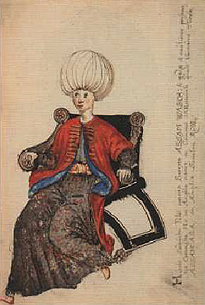Samson Rowlie on:
[Wikipedia]
[Google]
[Amazon]
 Samson Rowlie (died after 1588) was Chief
Samson Rowlie (died after 1588) was Chief
 Samson Rowlie (died after 1588) was Chief
Samson Rowlie (died after 1588) was Chief Eunuch
A eunuch ( , ) is a male who has been castration, castrated. Throughout history, castration often served a specific social function. The earliest records for intentional castration to produce eunuchs are from the Sumerian city of Lagash in the 2 ...
and Treasurer
A treasurer is a person responsible for the financial operations of a government, business, or other organization.
Government
The treasury of a country is the department responsible for the country's economy, finance and revenue. The treasure ...
of Algiers
Algiers is the capital city of Algeria as well as the capital of the Algiers Province; it extends over many Communes of Algeria, communes without having its own separate governing body. With 2,988,145 residents in 2008Census 14 April 2008: Offi ...
during Ottoman rule. Born in Norfolk
Norfolk ( ) is a Ceremonial counties of England, ceremonial county in England, located in East Anglia and officially part of the East of England region. It borders Lincolnshire and The Wash to the north-west, the North Sea to the north and eas ...
, England
England is a Countries of the United Kingdom, country that is part of the United Kingdom. It is located on the island of Great Britain, of which it covers about 62%, and List of islands of England, more than 100 smaller adjacent islands. It ...
, the son of a Bristol
Bristol () is a City status in the United Kingdom, cathedral city, unitary authority area and ceremonial county in South West England, the most populous city in the region. Built around the River Avon, Bristol, River Avon, it is bordered by t ...
merchant, Francis Rowlie, he was captured aboard of the ''Swallow'' and castrated by the Ottomans in 1577. He converted from Christianity to Islam
Islam is an Abrahamic religions, Abrahamic monotheistic religion based on the Quran, and the teachings of Muhammad. Adherents of Islam are called Muslims, who are estimated to number Islam by country, 2 billion worldwide and are the world ...
and took the name Hassan Aga. He served the Beylerbey of Algiers, Uluç Ali Pasha.
Richard Hakluyt's 1589 collection, ''The Principal Navigations,'' included a 1586 letter from William Harborne, England's ambassador to the Ottoman court, addressed to Hassan Aga, for the purpose of negotiating prisoner release. A 1588 watercolor portrait depicts Hassan Aga with white skin and rosy cheeks, wearing a large turban. He was reported to have been murdered.
References
{{reflist 16th-century slaves in the Ottoman Empire Converts to Islam Eunuchs English Muslims Algerian people of English descent Slavery in Algeria Algerian slaves